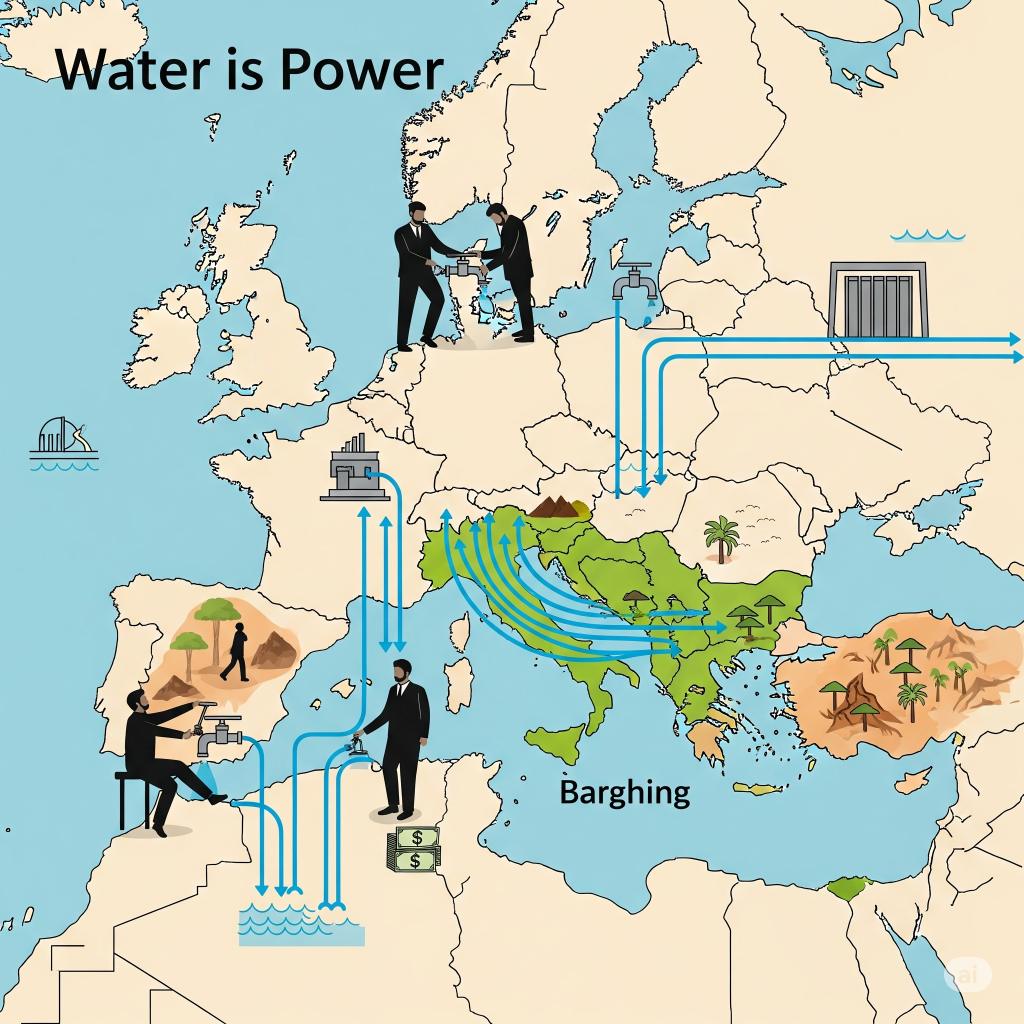PODGORICA, Montenegro – July 16, 2025 – As the Mediterranean basin endures another scorching summer, the narrative of its water crisis is often framed by images of cracked earth, strained reservoirs, and dire climate change projections. But to focus solely on the environmental and technical aspects is to miss the deeper, more potent reality: across the region, water is not just scarce; it is political currency.
From the shores of North Africa to the agricultural heartlands of Southern Europe, water scarcity has become a central arena for elite bargaining. More than a shared resource to be managed, control over water—its allocation, its infrastructure, and its price—is a powerful tool wielded by political actors to secure loyalty, negotiate power, and sideline rivals.1 This high-stakes game, played out in government ministries and closed-door meetings, threatens not only the region's environmental future but its political stability.The mechanics of this "hydro-politics" are often deceptively simple. A government can win the allegiance of a crucial agricultural region by green-lighting a new dam or subsidizing water for irrigation, ensuring a key voting bloc remains loyal. Conversely, it can discipline an opposition stronghold by delaying infrastructure maintenance or denying permits for new wells. In this context, a pipeline is never just a pipeline; it is a lifeline of patronage, and turning off the tap is a potent, if unspoken, threat.
This dynamic is starkly visible across the region. In North Africa and the Levant, where state control over resources is historically centralized, water has long been an instrument of statecraft.2 National projects, like Egypt's management of the Nile's flow or Morocco's extensive dam-building program, are presented as triumphs of national engineering, but they also serve to centralize power and create dependencies. Control over water allocation allows the state to reward compliant populations and marginalize dissenters, turning a basic human need into a lever of social and political control
Further north, within the borders of the European Union, the bargaining is more decentralized but no less intense. In Spain, decades of "water wars" have seen regional elites from Andalusia, Murcia, and Catalonia engage in fierce political battles over water transfers from rivers like the Tagus. These conflicts are not merely technical debates over hydrology; they are power struggles where regional leaders leverage their influence in Madrid to secure water for their constituencies—often powerful agricultural or tourism lobbies—at the expense of other regions. The outcome of these negotiations shapes regional economies and determines political fortunes.
Here in the Balkans, as nations like Montenegro and its neighbours advance on the path of European integration, the same fault lines are emerging. Debates over proposed hydropower projects on rivers like the Mora?a or Komarnica are framed around energy independence and economic growth. Yet, beneath the surface, they contain the seeds of future political bargaining over water rights, environmental concessions, and the distribution of economic benefits, which will invariably be used to consolidate political networks.
The ultimate cost of this politicization is profound inefficiency and instability. When water management decisions are driven by short-term political gain rather than long-term hydrological reality, the result is unsustainable over-extraction, ecological degradation, and festering social grievances. It creates a zero-sum game where one group's gain is another's loss, undermining the collaborative, basin-wide approaches essential for genuine water security.
Addressing the Mediterranean's water crisis, therefore, requires a radical shift. It demands moving from opaque elite bargaining to transparent, participatory governance. This means empowering independent regulatory bodies, basing allocations on scientific data rather than political expediency, and ensuring all stakeholders—from small-scale farmers to urban communities and environmental groups—have a meaningful voice.
Ultimately, tackling water governance is not just about ensuring sustainability; it is a prerequisite for lasting political stability. Until water is managed as a shared trust instead of a political weapon, the most volatile resource in the Mediterranean will not be its dwindling supply, but the power it confers on those who control it.

